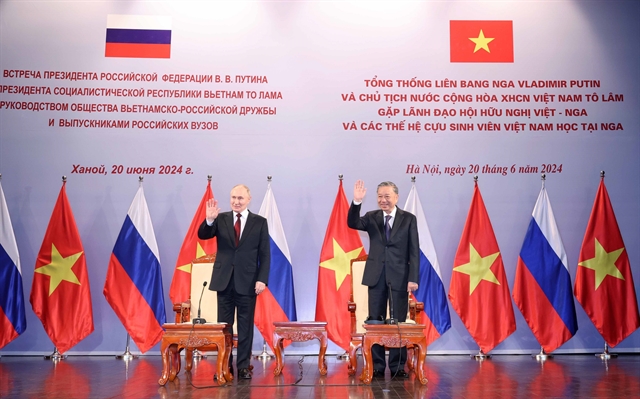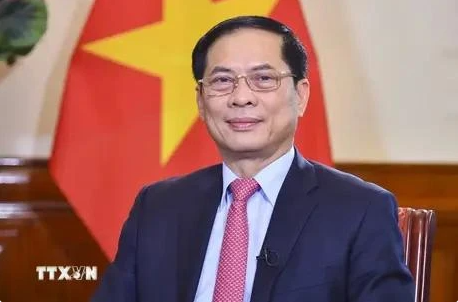 Politics & Law
Politics & Law

 |
| Foreign Minister Bùi Thanh Sơn. VNA photo |
HÀ NỘI - Through a joint statement issued, 11 cooperation agreements signed as well as high-level meetings held during Russian President Vladimir Putin's state visit to Việt Nam from June 19-20, the two countries have agreed on major orientations to further deepen bilateral comprehensive strategic partnership in five key aspects, stated Foreign Minister Bùi Thanh Sơn.
Firstly, Sơn said, the two sides concurred to strengthen dialogues and meetings at high and all levels, while effectively implementing cooperation mechanisms to promote collaboration in all fields, continuing to coordinate closely at multilateral forums, especially the United Nations, APEC, and ASEAN-Russia cooperation mechanisms.
Russia affirmed its support for Việt Nam to host APEC Year 2027, pledging that it is ready to coordinate with Việt Nam to successfully organise this important event, and continue to support ASEAN's central role in the regional architecture, Sơn said.
Secondly, Việt Nam and Russia affirmed that economy would continue to be a pillar and a focal point of the multifaceted cooperation between the two countries, the FM said.
The two sides would work together to settle difficulties and seek solutions to improve cooperation efficiency, enhancing the operational efficiency of bilateral cooperation mechanisms, especially the Intergovernmental Committee on Economic - Trade and Scientific - Technical Cooperation. They would soon reach and implement a master plan for the development of the Việt Nam - Russia cooperation to 2030, he said.
The FM added that the two sides would also coordinate to maximise the advantages of the Việt Nam - Eurasian Economic Union (EAEU) Free Trade Agreement, continuing to remove trade barriers, further facilitate bilateral trade, expand access to the Russian market for Việt Nam's consumer goods and agricultural and aquatic products, and promote investment cooperation, especially in infrastructure and energy.
Thirdly, both sides would expand their defence-security partnership in order to respond to non-traditional security challenges, and closely coordinate at multilateral forums on defence and security, especially ASEAN-led mechanisms such as the ASEAN Regional Forum (ARF), East Asia Summit (EAS), and ASEAN Defence Ministers' Meeting Plus (ADMM ), thus contributing to peace, stability, and security and safety in the Asia-Pacific and the world.
Fourthly, Việt Nam and Russia would beef up cooperation in the fields of education-training, science-technology, tourism, labour, culture, arts, sports, locality-to-locality cooperation, and people-to-people exchange, thereby strengthening the solid humanistic foundation for the bilateral comprehensive strategic partnership.
During the visit, 11 cooperation documents were signed among ministries, sectors, and businesses of the two countries, creating motivation to promote bilateral relations. The two sides agreed to continue creating favourable conditions for Vietnamese citizens in Russia and Russian citizens in Việt Nam to live, study, and work stably and act as a bridge of friendship between the two nations, Sơn stated.
Fifthly, leaders of the two sides discussed in a straightforward and trustful manner international and regional issues of shared concern.
Both sides affirmed their support for an equal international relations system based on international law and the United Nations Charter, especially the peaceful resolution of disputes without threatening to use and using force, and without intervention in each other's internal affairs.
Regarding the East Sea (known internationally as the South China Sea) issue, both sides showed their support to ensuring security, safety, and freedom of navigation and overflight in the sea area, not using force or threatening to use force, settling disputes through peaceful measures in accordance with the principles of the United Nations Charter and international law, especially the 1982 United Nations Convention on the Law of the Sea (UNCLOS 1982), as well as support to the full and effective implementation of the Declaration on the Conduct of Parties in the East Sea (DOC) and soon reaching a Code of Conduct in the East Sea (COC).
Son highlighted the significance of Putin's visit, underlining that it was considered an outstanding event of Việt Nam's external relations in 2024, showing Việt Nam's constant external policy of independence, self-reliance, multilateralisation and diversification of external relations for peace, friendship, cooperation, and development, active and proactive international integration, and being a friend and a trustworthy partner of the international community.
It also demonstrated Russia's great attention to Việt Nam in its "Turn to the East" policy, the FM held.
He said that the issuance of the joint statement on deepening their comprehensive strategic partnership and building on the achievements of the three-decade implementation of their Treaty on Principles of Friendly Relations reflected their determination to make bilateral cooperation more effective and substantive across all fields.
Russian President Putin's visit was a success, Sơn affirmed.
Along with the warm sentiments that Vietnamese people have for Russian people, the achievements recorded during the implementation of the 1994 Treaty on Principles of Friendly Relations between Việt Nam and Russia and important outcomes of President Putin's visit would be a solid foundation for the further promotion of the traditional and long-lasting friendship and the comprehensive strategic partnership between the two countries, FM Sơn concluded. VNA/VNS




